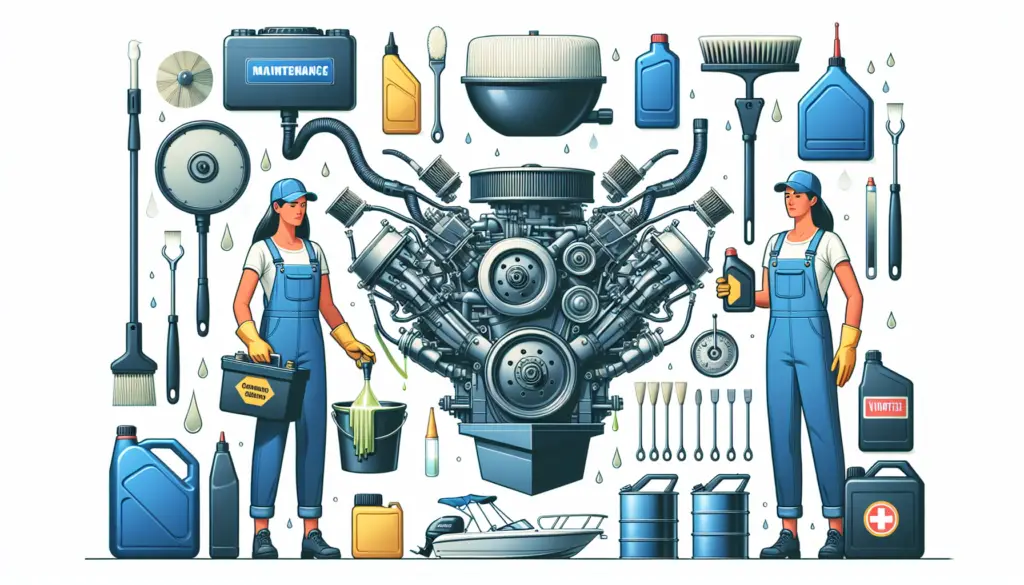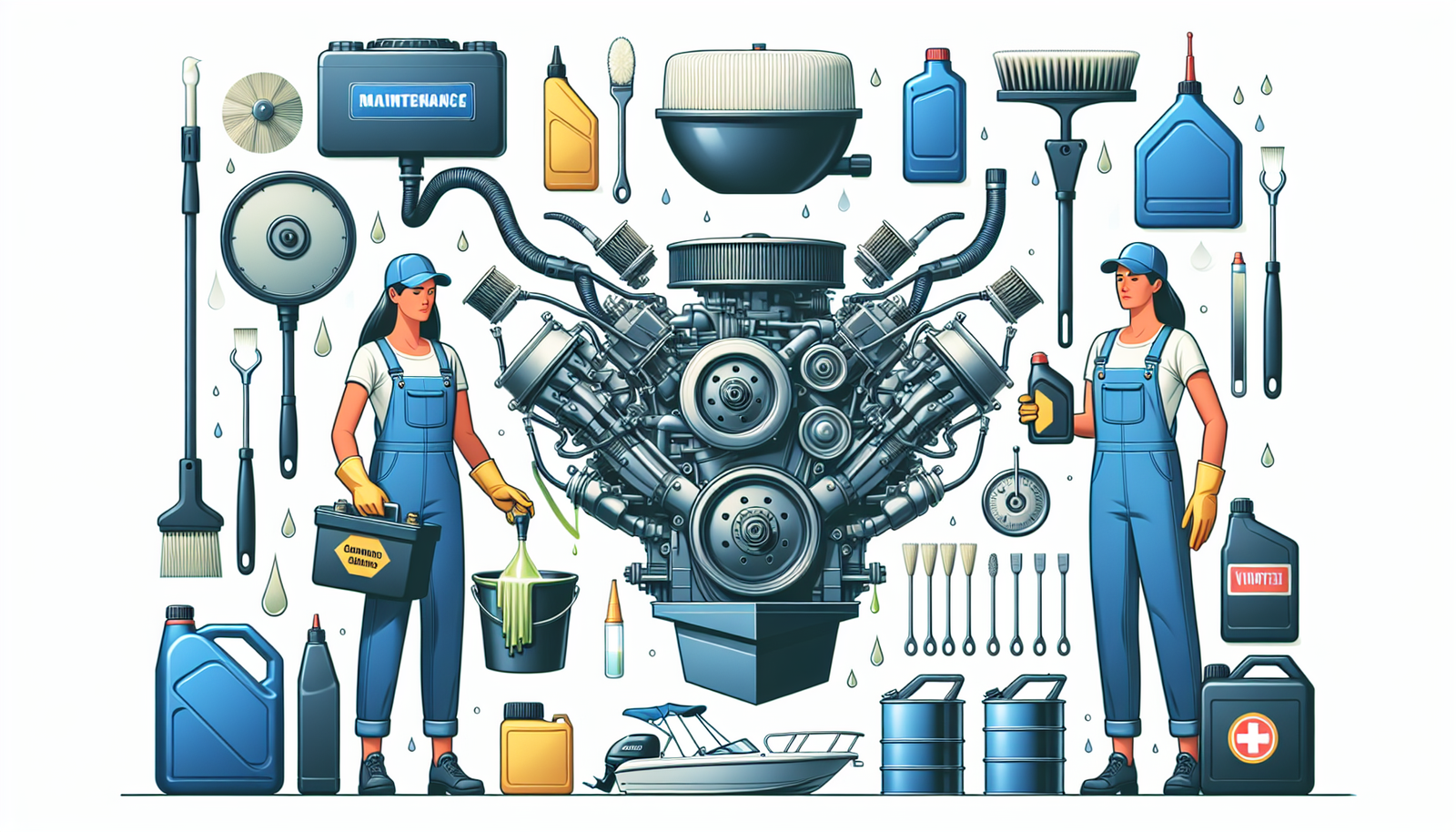Navigating the vibrant ocean waves, your ride stays smooth, the wind whooshes by, and there’s barely a sound as you confidently cruise across the deep blue. In this scenario, needless to say, your boat engine is in excellent shape and operates quietly. By turning this into a reality, you can unlock blissful maritime adventures. “The Best Ways to Keep Your Boat Engine Running Smooth and Quiet” offers practical, easy-to-implement tips and strategies to elevate your boating experience by optimizing engine maintenance and performance. In the following sections, you’ll explore crucial yet often overlooked steps for engine care, as well as useful hacks to keep your engine purring like a kitten, sans all unwanted noise and struggles. Dive into a reservoir of valuable insights to unlock a seamless journey across the waves.

Understanding your boat engine
Every great boat journey begins with understanding your boat’s engine. Much like the heart of a human body, the boat’s engine is its primary lifeforce, powering its movements and operations. Taking the time to comprehend your boat engine doesn’t only mean smooth sailing but also helps you preserve the boat’s longevity.
Analyzing the workings of the engine
Learning the intricate workings of your boat’s engine can do wonders for you in the long run. It’s much like a car’s engine, except it works under more harsh and corrosive conditions. Familiarize yourself with the components, functioning, and overall mechanism for a comprehensive understanding of just how your boat engine works.
Recognizing the normal sound and vibration of the engine
Sound and vibration are telling signs of your boat engine’s health. Sure, the boat’s engine will naturally create a hum or a purr when operating, but recognizing what sounds and vibrations are normal can help you identify when something’s wrong at the very onset. So, tune in to your engine’s normal behavior to be its best doctor.
The role of different engine parts
Each part of the engine has a specific role to play in its function. The boat engine comprises various components like the piston, cylinders, exhaust and intake valves, and more, each with a distinct purpose. Understanding these roles can help you recognize which part needs attention when troubleshooting engine issues.
Regular Engine Maintenance
Just like your car, your boat engine also needs regular upkeep to operate efficiently. It extends its lifespan, ensures optimal performance, and avoids the hassle of unanticipated breakdowns.
The importance of regular engine check-ups
Routine engine check-ups are paramount for detecting potential issues early on, allowing you to deal with them proactively. It reduces the risks of engine failure during a voyage and enhances the overall safety and convenience on board.
Finding a trusted mechanic
A trusted and proficient mechanic is like a friend to your boat. They know just what your boat needs and when, based on their expertise and experience. Investing in a dependable mechanic means fewer engine worries for you.
Preventive measures during off-seasons
During off-seasons, your boat engine hibernates. But this doesn’t mean it doesn’t need care. Taking preventive measures like cleaning and covering the engine, adding fuel stabilizer, etc., protects your boat engine from potential damage due to humidity and temperature changes.
Recognizing potential problem signs
Your boat engine will usually give you an early warning if something’s off, such as strange noises, smoke or overheating. Becoming acquainted with these potential problem signs can help you take prompt corrective measures and avoid unnecessary wear and tear.
Using Correct Fuel and Lubricants
Fuel and lubricants are the lifeblood of your boat engine, enabling it to function smoothly and effectively. Using the correct fuel and lubricants can drastically improve your boat engine’s performance and longevity.
Understanding your engine’s fuel requirement
Different boat engines have different fuel requirements – some may need gasoline, others diesel, or even a specific octane level. Understanding your engine’s specific fuel needs Optimizes its performance and even saves fuel costs!
Selecting the best lubricants for smooth operation
Quality lubricants reduce friction among engine parts, keep them clean, and minimize wear and tear. Selecting lubricants compatible with your boat engine assures its smooth operation and extends its life span.
Avoid mixing different fuel types
Oil and water don’t mix, and neither should different fuel types or grades in your boat’s engine. It’s best to stick to the fuel type your engine is designed for, as mixing can lead to engine breakdowns or decreased performance.
The effects of low-quality fuel on your engine
Low-quality fuel is a false saving. It can result in performance issues, like low power outputs, poor mileage, or even severe engine damage over time. Investing in quality fuel means investing in a healthy engine.

Engine Cleaning and Flushing
Maintaining cleanliness in your boat engine not only guarantees the smooth operation but also extends the lifespan of the components.
How to appropriately clean your engine
Engines accumulate grime, dirt and other impurities over time, hindering their function. Regular cleaning using suitable cleaning agents keeps your engine looking, feeling, and functioning at its best.
The Importance of Regular Engine Flushing
Given that your boat is constantly in contact with salty seawater, regular engine flushing is critical to preventing the corrosive effect of salt deposits on your engine parts.
Dealing with rust and corrosion
Rust and corrosion are your boat engine’s archenemies. Regular cleaning, painting, and even using rust inhibitors can effectively combat these culprits, ensuring the longevity of your engine and its components.
Tips for doing it by yourself
While cleaning and flushing might seem daunting, fear not! With the right tools, products, and a little know-how, it can be a simple and satisfying task. Remember safety first – always disconnect the battery before you start.
Effective Cooling System
An efficient cooling system is imperative to prevent engine overheating—a common cause of engine issues.
Overheating and its impact on engines
Overheating can lead to severe damages such as melted piston, blown gaskets, and seized cylinders. It’s best to be informed about its signs— like white smoke in the exhaust or a high reading on the temperature gauge— and deal with them on time.
Maintaining correct coolant levels
Having the right coolant level ensures that your engine is effectively cooled. Regularly check the coolant reservoir levels and refill when necessary, with the engine-specific coolant to prevent overheating.
Regularly checking the cooling system
The cooling system—consisting of the cooling pump, coolant, radiator, etc.—needs regular monitoring and maintenance. This ensures it’s working optimally and prevents any potential overheating issues.
Dealing with leaks and damages
Any leak or damage to the cooling system can lead to its inefficiency and cause engine overheating. Early detection and rectification of any such issues can save you a lot of troubles and expenses.
Wheel and propeller care
The propeller of your boat is as important as its engine, for it enables your boat’s movement.
Significance of clean wheel and propeller
A clean wheel and propeller mean less drag and greater efficiency. Regularly cleaning them of any debris or marine growth will enhance your boat’s speed and save fuel.
Dealing with visible signs of damage
Any damages or cracks on the wheel and propeller can hinder its function and cause vibration or noise. If you observe any such signs, it’s best to get them repaired or replaced promptly.
The effects of propeller imbalance on noise and vibration
An imbalanced propeller is a significant contributor to boat noise and vibration. Therefore, regularly ensure the propeller’s balance to reduce noise/vibration and optimize the boat engine’s overall performance.
Regular Battery Checks
An engine needs a strong and reliable battery for its function. Performing regular battery checks ensures this.
The importance of a healthy battery
A healthy battery is crucial for starting the engine and powering the electrical systems on your boat. It ensures your boat’s dependability and prevents unanticipated breakdowns.
Recognizing battery warning signs
Certain warning signs, like slow engine crank or dimming lights, indicate a weak battery. Recognizing these signs can help you prevent a potential battery failure during your sea voyages.
How to charge boat batteries properly
Proper charging of boat batteries is a vital part of battery maintenance. Regularly charging the battery while ensuring it doesn’t overcharge will significantly enhance the battery’s lifespan.
Choosing the correct battery for your boat engine
Different boat engines require different types of batteries. Choosing the right battery to match your specific boat engine ensures the smooth function of the engine and boat electronics.
Proper Storage Conditions
Proper storage of your boat can preserve its engine and other parts in the best possible way during off-seasons.
Safe and suitable storage practices
Securely storing your boat, preferably in a dry, cool place, free from UV exposure, can protect it from potential damages caused by harsh weather. Engine, battery, and the whole boat’s longevity can be significantly enhanced through good storage procedures.
Covering and protecting the boat engine
Your boat engine is an investment worth protecting. Using a good quality cover for your engine can protect it from dirt, moisture, and UV lights, all of which can cause damage to your engine over time.
The impact of temperature and weather on the engine
Temperature extremes, humidity, and UV light can lead to rust, corrosion, battery failure, and other damages on your boat engine. Recognizing these impacts can help you take measures to prevent these damages effectively.
Reducing Engine Noise and Vibration
Noise and vibration can be uncomfortable and disrupt your peaceful time at sea. Reducing these can significantly enhance your boat journeys.
Identifying sources of excessive noise
Excessive noise usually signifies engine problems, propeller imbalance, or other issues. Identifying the exact source can help you address it effectively and reduce noise.
Various ways to reduce engine noise
There are various ways to reduce engine noise, from regular maintenance to using noise-reducing equipment. Visit your trusted mechanic to discuss the best solution for your boat engine.
Understanding the role of vibration in noise production
Vibration often causes noise in boat engines. Understanding that vibration can help you deal with it effectively and potentially reduce your boat’s overall noise.
Customizing your Boat Engine
Customizing your boat engine can bring about significant improvements in its performance, noise reduction, and more, bringing you many smooth sailing days ahead.
Upgrading for performance and noise reduction
Upgrades can significantly improve your boat engine’s performance and reduce its noise. These can range from installing soundproofing material to replacing worn-out parts or even the entire engine itself.
Choosing the right modifications
Not all modifications suit every engine. Therefore, discussing with a trusted mechanic and selecting just the right modifications as per your engine’s specifications, can optimize its performance without causing any harm.
Impact of modifications on engine warranty
Remember that certain upgrades or modifications can void your engine’s warranty. So it’s best to verify potential impacts on your warranty before going ahead with any modifications.
Investing in noise reduction technology
Investing in modern noise reduction technology, such as sound barriers and noise-cancelling materials, can significantly reduce your boat engine noise, making your time on the boat more relaxing and enjoyable.
In conclusion, understanding and caring for your boat engine are just as important as enjoying the waves. Regular maintenance and preempting potential problems can keep your boat engine running as smoothly and quietly as possible. Here’s to many quiet, satisfying sails ahead!


[…] Moreover, storage helps to prevent severe damage that can result in costly repairs. Think of it as preventive maintenance, future-proofing your […]
[…] Like any other kind of engine, regular maintenance can dramatically extend the life of your boat engine, keep it running at peak performance, and prevent serious, costly damage. […]